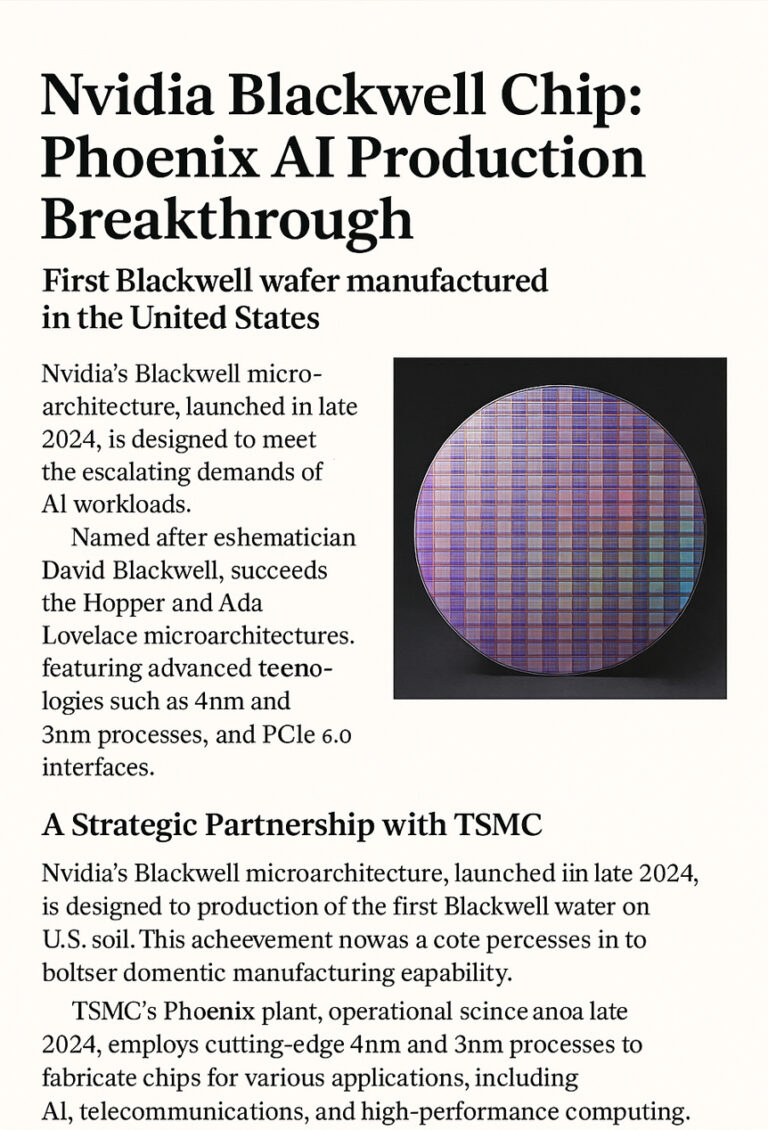Premium Biz Post – Nvidia recently unveiled the first Blackwell chip wafer manufactured in the United States, marking a significant advancement for artificial intelligence (AI) technology. This milestone was achieved in collaboration with Taiwan Semiconductor Manufacturing Company (TSMC) at their Phoenix, Arizona facility. Consequently, this marks a pivotal moment in reshoring AI chip production and strengthening the U.S. semiconductor supply chain.

The Genesis of Blackwell
The Blackwell microarchitecture, which Nvidia launched in late 2024, is specifically designed to meet the escalating demands of modern AI workloads. For instance, the architecture, named after mathematician David Blackwell, succeeds the Hopper and Ada Lovelace microarchitectures. Furthermore, it features advanced technologies like 4nm and 3nm processes, alongside support for HBM3e memory and PCIe 6.0 interfaces. In fact, these innovations enable substantial improvements in performance and energy efficiency. Ultimately, this positions Blackwell as a formidable player in the AI accelerator market.
A Strategic Partnership with TSMC
The collaboration between Nvidia and TSMC has culminated in the production of the first Blackwell wafer on U.S. soil. Crucially, this achievement is more than just a technical accomplishment; it’s a strategic move to bolster domestic manufacturing capabilities. The TSMC Phoenix plant, operational since late 2024, is key to this effort. Specifically, it employs cutting-edge 4nm and 3nm processes to fabricate chips for various applications, including AI and high-performance computing. Therefore, the facility’s role in producing Blackwell chips highlights the growing importance of U.S.-based semiconductor manufacturing within the global tech ecosystem.
Enhancing the U.S. AI Supply Chain
The production of Blackwell chips in Phoenix is a testament to the United States’ commitment to strengthening its AI infrastructure. By establishing domestic manufacturing capabilities, Nvidia and TSMC are reducing dependency on foreign chip suppliers. In doing so, they are directly enhancing the resilience and security of the U.S. tech industry. Ultimately, this initiative aligns with broader efforts to promote innovation and technological leadership within the country.
Read More : ”Aromatherapy Candle Craft Calming Scents with Creative and Economic Value”
Implications for the AI Industry
The introduction of Blackwell chips into the market has profound implications for the AI industry. Due to their advanced architecture and manufacturing processes, these chips offer superior performance and efficiency. Consequently, they are highly suitable for demanding AI applications, such as large language models and high-performance computing tasks. This development positions Nvidia as a clear leader in AI hardware. Moreover, it sets a new benchmark for the entire industry, thus encouraging further innovation and competition.
The Future of AI Hardware
As the demand for AI technologies continues to surge, the need for advanced hardware solutions becomes critical. Nvidia’s Blackwell chips represent a significant step forward in meeting these demands. Looking ahead, however, Nvidia plans to introduce the Rubin microarchitecture. This new architecture is expected to deliver even higher performance levels, which will further solidify the company’s position at the forefront of AI hardware development.



